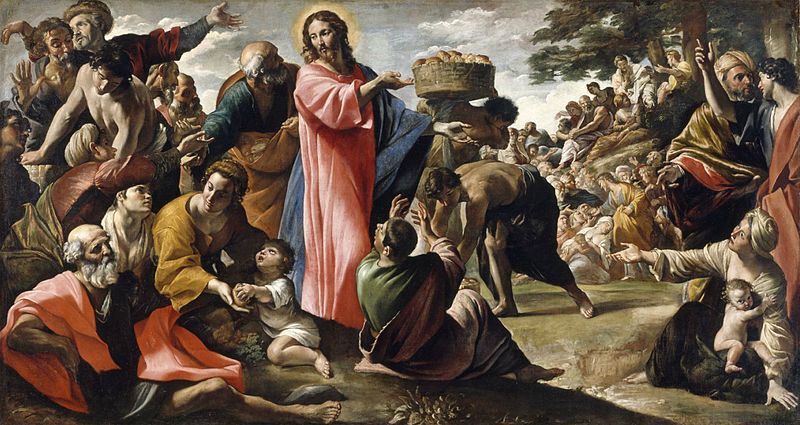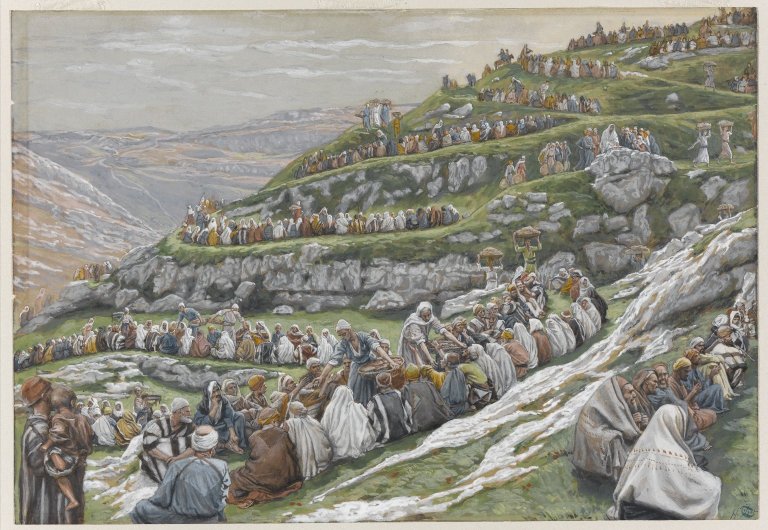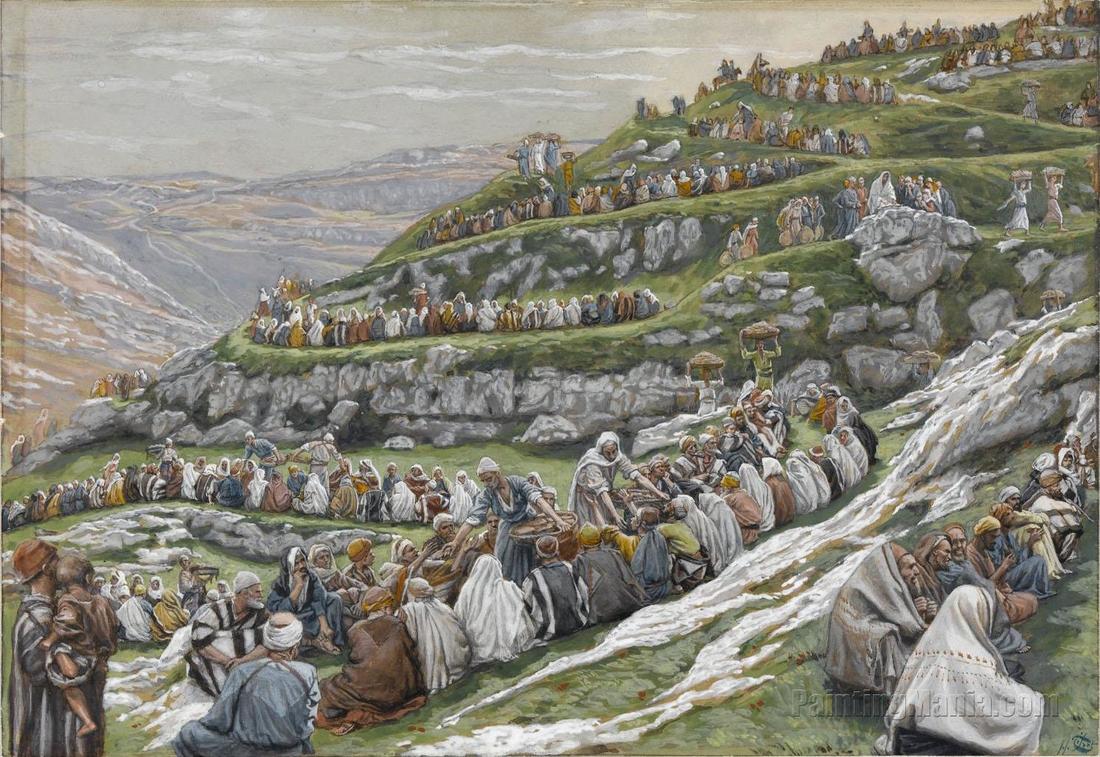Mark 8:1-9
Pastor James Preus
Trinity Lutheran Church
July 14, 2024
Why did God cause the people of Israel to wander around in the wilderness for forty years, without the ability to plant crops, eating manna from heaven, which He provided each morning? God tells Israel why through Moses in Deuteronomy chapter 8, “And He humbled you and let you hunger and fed you with manna, which you did not know, nor did your fathers know, that He might make you know that man does not live by bread alone, but man lives by every word that comes from the mouth of the Lord.” (vs. 3) Now, when someone tells you that man does not live by bread alone, it is easy to dismiss him, because you need bread to live. That is, you need to eat, you need a place to live, you have bills to pay. That’s bread. Yet, when you realize that the person telling you that you do not live by bread alone is the one who provides all your bread, who provides everything you need to live on, that should cause you to listen more closely.
This is what Jesus does in our text. Jesus is God. St. Paul tells us that it was Christ who fed and gave water to the people of Israel in the wilderness (1 Cor. 10:4). And in fact, Christ sustains the entire creation, which He Himself created with the Father and the Holy Spirit. When Jesus fed the 4,000 in the wilderness, He proved Himself to be the God who provides for the whole creation. He provides for you still today. Yet, He did not feed all these people simply to teach us to trust in Him for all our bodily needs. He fed these people to exhort us to seek first the kingdom of God and His righteousness, because He will certainly add the rest unto us (Matt. 6:33).
Jesus feeding the 4,000 in the wilderness teaches us how He provides living bread for His Church on earth. Living bread is not like the bread you consume, but then you die, like your food, money, clothing, and stuff. This is bread, that if you eat of it, you will never die, but live forever. This bread of life is the very flesh and blood of Christ, which He gave for the whole world on the cross.
The feeding of the 4,000, while similar, is different from the feeding of the 5,000 just a couple chapters earlier. The feeding of the 5,000 was a crowd of mostly Jews, while the 4,000 were mostly Gentiles. The 5,000 were fed with five loaves of bread, which represent the five books of Moses. Jesus is the prophet like Moses, who is greater than Moses (Deuteronomy 18:15-18; Hebrews 3:3). After feeding the 5,000, there were twelve baskets of bread left over. These twelve baskets represent the twelve tribes of Israel. Jesus is the promised Messiah of the Jewish people, the Son of David, who has come to redeem Israel and rescue Judah.
The feeding of the 4,000 teaches us that Christ is not only the Savior of the Jews, but of the whole world. Four is the number of the earth. 1,000 is the number of completeness. Feeding the 4,000 indicates that Christ will feed the entire world. Seven is a holy number. Three is the number of God, who is three persons in one Godhead. Four is the number of the earth. Three plus four is seven. Seven means God has joined His creation. So, that Jesus fed the 4,000 with seven loaves of bread indicates that Christ will redeem the entire world with His flesh, because Christ is the union of God and man, the number three joined to the number four. God joined His creation. Seven represents the incarnation. The seven loaves represent the Godman Christ’s body, which He offered up as living bread for the world. This is hinted at by the fact that the crowd was with Jesus for three days before He fed them, because Christ needed to suffer and die on the cross and rest in the tomb three days, before He could feed the world His lifegiving bread.
And despite there only being seven loaves, and a few fish, everyone in the crowd ate until they were satisfied. And we know that there was no one left who was still hungry, because they gathered seven large baskets full of leftover bread, that the people were too full to eat. Likewise, although Christ is only one man, His perfect obedience under the Law and His bitter sufferings and death on the cross is enough to make atonement for the sins of the whole world, because He is both God and man, three joined to four. And that is exactly what He has accomplished. Christ has redeemed the world with His blood. Christ has gained an inexhaustible supply of the Bread of Life, so that no matter how many feast on Him in faith, there will always be more Bread of Life to forgive, comfort, and save.
Christ has given this inexhaustible supply of the Bread of Life to His Church, so that sinners may receive it for their salvation. They started out with just seven loaves of bread, but after feeding 4,000 men, they had seven baskets of bread left over. And these weren’t small baskets, which fit one loaf each. These were massive baskets, big enough to fit a grown man in to lower him down from a wall (Acts 9:25), baskets big enough to fit fifty loaves of bread each. The point is, no matter how much bread Jesus gives out, there is always more to give! And He has given this inexhaustible supply to His Church on earth. Seven is a holy number. It represents God joining His creation. With the seven loaves, it represents the incarnation of Christ, God becoming man. With the seven baskets, it represents the Church of Christ, His very bride and body, which is joined to Him forever. St. Paul writes to the Ephesians in chapter 1, “And He (the Father) put all things under His (Christ’s) feet and gave Him as head over all things to the Church, which is His body, the fullness of Him who fills all in all.” (vss. 22-23)
Christ gave the inexhaustible, that is, incapable-of-running-out supply of lifegiving bread to His Church. That is what these seven baskets represent. He did not give this supply only to the Office of the Ministry. He gave it to His whole Church. Yet, He charged His ministers to distribute this bread to His Christians, just as the disciples distributed the bread and fish to the 4,000. St. Paul describes ministers of the Word in this way, “This is how one should regard us, as servants of Christ and stewards of the mysteries of God.” (1 Corinthians 4:1) Stewards are managers of that which is not their own. This is why Paul instructed the pastors of Ephesus, “Pay careful attention to yourselves and to all the flock, in which the Holy Spirit has made you overseers, to care for the Church of God, which He obtained with His own blood.” (Acts 20:28)
Christ instituted the Office of the Holy Ministry, not to set up a special class to rule over His Church, but so that He might feed us and assure that we get the bread of life. This bread of life is given and received by preaching and hearing the Gospel, by giving and eating the Sacrament. St. Paul proclaims, “For ‘everyone who calls on the name of the Lord will be saved.’ How then will they call on Him in whom they have not believed? And how are they to believe in Him of whom they have never heard? And how are they to hear without someone preaching? And how are they to preach unless they are sent? As it is written, ‘How beautiful are the feet of those who preach the Gospel! … So faith comes from hearing, and hearing through the word of Christ.” (Romans 10:13-15, 17) And Jesus declares to His ministers, “The one who hears you hears Me.” (Luke 10:16)
So, Christ has placed His ministers in His Church to feed His sheep. As the disciples distributed the bread, and as much as they distributed, there was even more leftover, so Jesus’ ministers proclaim the Gospel, declare absolution, baptize, and feed Christ’s Christians His body and blood, and as many as hear the Gospel, believe it, and receive the forgiveness of sins, there is always more leftover!
Finally, you need this bread of life. In 1 Kings chapter 19, an angel awakened the prophet Elijah to feed him heavenly food, saying, ““Arise and eat, for the journey is too great for you.” (vs 7) Jesus likewise said that if the crowd went away hungry, they would faint on the way. Well, I’m telling you today that the journey is too great for you. This world is a desolate wilderness filled with wild beasts seeking to devour you, that is it is filled with Satan and his demons. They attack you with all forms of evil. They try to make you soft with comforts that pull you away from Christ. They know your sinful inclinations and where your weaknesses are. They attack you with doubts, lusts, hatred, murder, adultery, perversions, self-righteous hypocrisy, complacency and whatever else can wear you down and destroy your soul. And your flesh is no help. It wars against your spirit and desires what is evil. Your job, money, friends, house, entertainment, property, they’re no help. They’ll pass away just like yesterday’s dinner.
Only the bread of life, Christ Jesus, can strengthen you for this journey. Only the Gospel that assures you of the forgiveness of sins for Christ’s sake, which feeds you the very body and blood of Christ, which strengthens your faith, soothes your conscience, and gives you certainty of eternal life, can strengthen you for this journey.
Jesus looked at the crowd helpless and hungry in the wilderness, and He had compassion on them. Jesus has a compassionate heart and an almighty hand. And so, Christ looked at us with compassion. His heart broke for us when He saw that we were lost and doomed to sin, death, and hell. So, He came down and became our bread of life, and He provided lifegiving bread to His Church, so that all who come to hear and receive His Gospel, receive forgiveness and everlasting life.
You need this bread of life. Anyone or thing that tells you that you don’t is a liar. Anyone or thing that tells you that you can make this journey without it, that you can continue to miss church, avoid the Sacrament, plug your ears to Christ’s preaching, is from the devil and seeks your destruction. But your Lord Jesus says, ““Come, everyone who thirsts, come to the waters; and he who has no money, come, buy and eat! Come, buy wine and milk without money and without price. Why do you spend your money for that which is not bread, and your labor for that which does not satisfy? Listen diligently to me, and eat what is good, and delight yourselves in rich food. Incline your ear, and come to me; hear, that your soul may live.” (Isaiah 55:1-3) The journey is too great for you. If you continue in the wilderness without eating the bread of life, you will faint on the way and perish. This feast cannot run out, but time can.
As long as we live on this earth, we will battle temptation, sin, sorrow, and death. Yet, Christ has given His Church the bread of life, which strengthens against temptation, forgives sins, comforts souls, and grants eternal life. So, come and eat. Amen.



 RSS Feed
RSS Feed